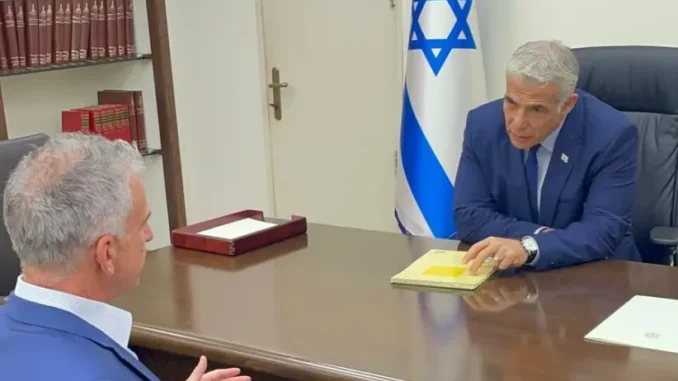The impending Iran nuclear deal will likely not end Israeli covert operations against Tehran.

Prime Minister Yair Lapid meets with Mossad chief David Barnea on August 25.
Something has changed in the Mossad.
And that something means the impending Iran nuclear deal will not likely end Israeli covert operations against Tehran.
If at some point in the past, it was content to take orders from prime ministers and be included around the table next to the juggernaut IDF, the spy agency is now taking center stage more often and helping to shape policymakers’ views much more deeply.
There was a brief moment when Yossi Cohen stepped down in June 2021 and was replaced by David Barnea, who would supposedly lower the clandestine agency’s profile, when some predicted that the Mossad would return to a lesser level of influence.
It was said that Cohen was especially close to former prime minister Benjamin Netanyahu and was unusually aggressive in his views toward Iran, and that this helped him influence a more confrontational attitude toward the ayatollahs.
But Cohen and Netanyahu are long gone.
Even Netanyahu’s immediate successor, Naftali Bennett, has been out of office now for over a month.
And yet Barnea and the Mossad seem to be the leading voice in the security establishment today on how to handle the Islamic Republic.
Barnea’s public statements on Thursday were unprecedented – except that they were not.
Only three weeks into his tenure, Iran’s key Karaj nuclear facility was hit, reportedly by the Mossad.
Within three months there was another leak of a Mossad hit on a major Iranian facility that could be connected to developing nuclear weapons.
In December 2021, Barnea gave an “internal” speech which was published to the world promising that he would continue to strike Iran no matter what and prevent it from gaining nuclear weapons at all costs.
Many other actions were attributed to the Mossad, but especially from late April to mid-June of this year, Iranian nuclear scientists and senior Islamic Revolutionary Guard Corps officials started falling like flies.
Barnea and his team were so successful in thwarting Iranian counterattack attempts that Supreme Leader Ayatollah Ali Khamenei fired the powerful chief of IRGC intelligence, Hossein Taeb.
All signs now are that the US and Iran will return to some form of the 2015 JCPOA Iran deal in coming weeks or at most months.
When the deal was sealed in July 2015, it froze some of the Mossad’s most aggressive operations against Iran.
Until the Mossad seized Iran’s nuclear archives in 2018 and the International Atomic Energy Agency condemned Tehran in June 2020, there were no major reported attacks by the agency.
Khamenei should not expect the same respite this time.
Israelis at the time believed the deal would not deliver security for the Jewish state, but needed to give the deal a chance lest they be blamed for causing its demise.
This time is different
It is different because the Mossad caught Iran red-handed lying about its past nuclear military dimensions. It is different because the world and the spy agency saw how quickly the Islamic Republic was able to restart its nuclear program and then jump it forward. And it is different because the terms of the new expected deal will leave the ayatollahs closer to six months from weaponizing uranium a opposed to 12 months and because they have developed much more advanced technologies, such as IR-4 and IR-6 centrifuges.
However, it is also different because Barnea has continued, if not expanded the Mossad’s new level of influence and public campaigns which started under Cohen.
He has not relegated himself to being behind the scenes or deferred to being the IDF’s big brother.
Rather, some even claim that he is driving the Iran agenda both during Bennett’s term and during Prime Minister Yair Lapid’s current term.
Barnea may lack prior closeness to Lapid, but the prime minister who is only in office now for six weeks, is much more reliant on him to maintain his security bona fides than Netanyahu was on Cohen.
Cohen was the fifth Mossad chief Netanyahu had worked with. When Cohen took office, Netanyahu already had over a decade under his belt in the big chair.
It will be interesting to see if Lapid stays in office past the November election, and whether at some point he will strike a more independent tone from Barnea. Some of this may come assuming Lapid and Defense Minister Benny Gantz follow through soon on appointing a new IDF chief of their choosing.
At this critical juncture in the Iran nuclear standoff, Barnea will have an almost free hand regardless of what the piece of paper says on which representatives from Washington and Tehran sign their names.



Leave a Reply
You must be logged in to post a comment.